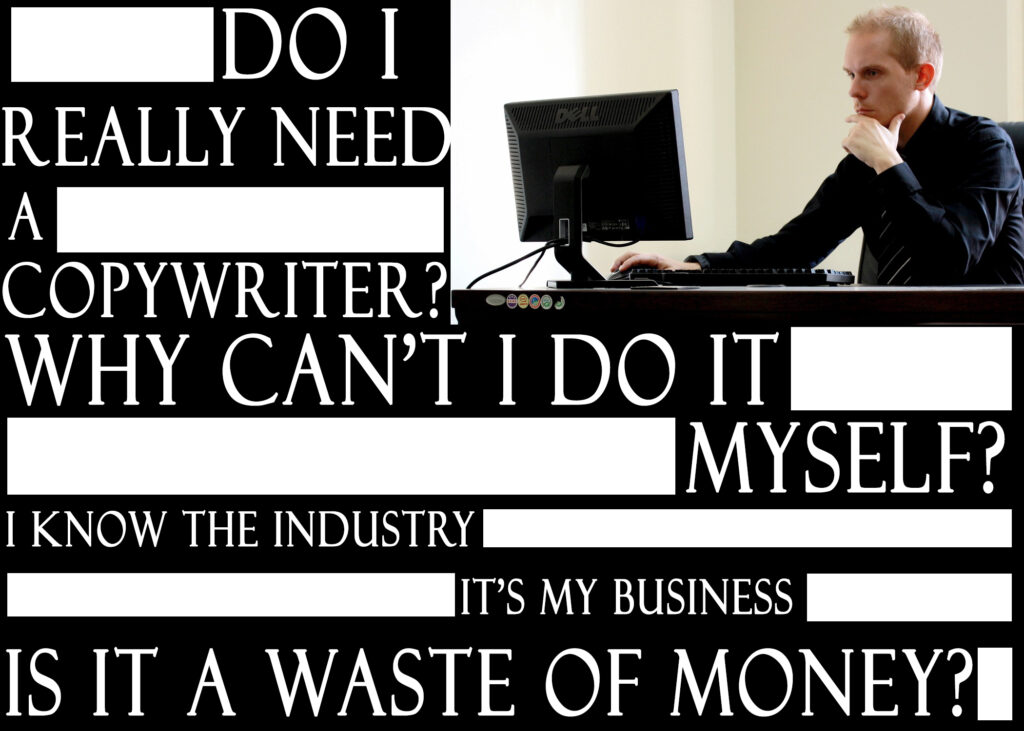Do you really need to hire a copywriter?
Do you really need to hire a copywriter? As a copywriter, I would obviously say yes. However, as marketing research becomes more scientific and sophisticated, it all supports the importance of relevant, persuasive and valuable copy to any business.
There is little doubt now that writing and sharing consistently industry-related, engaging and high-quality content is critical for success.
It doesn’t matter if you produce copy for your website and online presence, or print media like brochures or direct sales letters.
But I don’t expect you to take my word for it…
A seminal study by Conductor measured the impact early-stage, educational content has on brand affinity, trust, and conversion. The results speak for themselves…
You can read the full study here.
In fact, once you start to explore all the areas a copywriter adds value, it becomes clear how vital copywriting services are and why hiring a copywriter is one of the most powerful things you can do to support your business.
In this two-part guide, I’m going to take you through some of the main reasons why professional copywriting services are so important.
1. Focus on your strengths
"Can’t I just write it myself?"
After all, it’s your business, and you’re the expert. Why hire a copywriter to write about something you know like the back of your hand?
Well, that’s one of the most important reasons to hire a copywriter. You’re the expert in running your business, not writing about it. After all, a brain surgeon may know all there is to know about the intricacies of performing a neuroendoscopy, but does that mean they can also write an engaging and persuasive piece for wannabe medical students?
Not necessarily.
The very fact you have been pouring all your energy into learning how to run a business probably means you haven’t been dedicating uncountable hours to polishing the fundamental writing skills required to engage, excite and enflame desire in potential customers.
2. Engagement
Let’s look at some of those fundamental skills.
- Structuring your copy for impact and interest
- Choosing the exact words that connect with potential customers
- Pulling together hours of research into a compelling sales presentation
- Positioning proof elements to strengthen your credibility
- Testing and enhancing your call to action
These 5 key points are just some basic techniques and skills used to engage your customer. You can have the best product, the most incredible service, but if no-one engages with it, reads about it, or develops an interest in it, it doesn’t matter.
3. • Buyer psychology
All good copywriters are amateur psychologists (my degree is in psychology, for example). I spend a lot of time finding out what people think and how that makes them act. There is nothing sinister about this – you can’t force people to buy something they don’t want, all you can do is ignite a desire that is already there.
So, how do you know what they desire, deep down? Hours of research and a deep understanding of human psychology is required to get to know your customer.
You probably know a lot about your customers on one level because you know the industry’s wants and needs, but can you distil this knowledge into persuasive, readable copy that clearly shows a prospective customer how your product or service is going to take them from where they are to where they want to be?
4. Reputation
Strong, well-written copy makes a great impression. But a good copywriter doesn’t just know how to write a nice blog. They know when to write a guide, white paper, how to structure an email campaign, when to include infographics, testimonials and how to craft an offer.
By using a variety of formats, you increase the reach of your content. Some people want to read a blog, others prefer social media. Some prefer images, others a video. Some feel better informed after reading a white paper, some after a case study.
By looking at your company, its vision, current position and past marketing, I can help you choose the right pieces of content at every stage of your marketing campaigns.
5. Credibility
Who is your customer? To get their attention you have to say something relevant to them… in a way they will listen to. All businesses need to develop their own voice to keep their brand consistent, increase credibility and to ensure they stand out in a crowd.
I consider this to be so fundamental, I’ve written an entire series around choosing the correct tone, which you can read here.
6. Expertise
People buy from businesses they like and trust. By building up a reputation for insightful, valuable and on-trend thought leadership pieces, you become both likeable and trustworthy.
Again, the key research findings from Conductor supports this:
- A week after reading a piece of educational content from a brand, 73.3% of consumers identified the brand as “trustworthy,” an 9% increase since initially reading the content. (64.4% to 73.3%)
This is where the subtleties of a good copywriter come into their own. You quietly build up a reputation for being the expert in your niche with consistently relevant and wise content. You earn a place in the conscious mind of a prospect. And when they are ready to buy, they go to the expert – to you.
We discuss the idea of shareability later, but people, knowing your content is reliable, honest and factually correct, will share it with friends, family, and peers. And so, a reputation is seeded, nurtured and grown… along with your profits.





